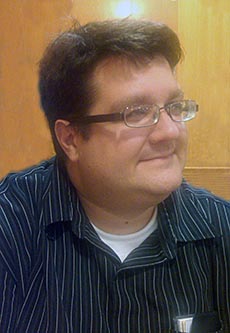Challenges Keep the Muscles in Your Head Working
Interview with IdeaConnection Solver and Facilitator Tony Contento
Tony Contento has a PhD in Molecular Biology and during the past 12 months has worked on a number of challenges for IdeaConnection as both a problem Solver and a Facilitator. He has met with success in both roles.
What drew you to IdeaConnection?
 I think the initial draw was probably monetary, but once I got there it was more the intellectual curiosity, the ability to work with a group of experts on a project. I know sometimes it's just for a corporation, but there was the potential to work on something free of charge for humanitarian style projects and maybe make a difference.
I think the initial draw was probably monetary, but once I got there it was more the intellectual curiosity, the ability to work with a group of experts on a project. I know sometimes it's just for a corporation, but there was the potential to work on something free of charge for humanitarian style projects and maybe make a difference.Also, the working aspects are nice too. There are a lot of people just next door to my field that I never would come into contact with unless I got lucky. So I never would have gotten a chance to talk to someone like Chris Cullis or David Lightfoot. Even though they are into plant sciences, the stuff they do is different from what I do, so we would have never linked together.
I'm glad I know both of them, and they're both phenomenal scientists. They're further along in their careers than I am too, so there’s a sort of a mentorship aspect that comes along with this kind of networking. Working for IdeaConnection has been invaluable to me, not just for job searches, but for steering my potential, my future career.
In the year that you've been working on challenges, what's your problem solving success rate?
I've completed, either as a Facilitator or a team member, eight total challenges since last year and we were paid for four of them. There's one were finding out this week, so it might be more, we'll see.
I guess when you arrive at a successful solution it's a nice feeling?
Oh yes. I honestly think that the feeling of success is at the end, no matter whether or not you get paid. Because all of these solutions, they're all answers to the Seekers questions. The Seeker might not be looking for the answer we give them, but the idea is still there.
It is quite possible that if the Seeker doesn't find the value in your solution, that if you as a team want to get together, you can go off and pursue it somewhere else. As long as you make sure it's not specific to a challenge. And the nice thing there is that's the way that IdeaConnection is actually set up, if the IP isn't used, it stays with the team.
So, if you don't necessarily hit the particular jackpot that the solution Seeker wants the weeks spent working on the challenge, don't go to waste.
Yes. The thing to keep in mind is it's never a waste of time. For me it's more the mental stimulation, the obstacle course of going through these challenges and trying to find the solution. In some cases we've had some really straightforward requests that had very straightforward answers and maybe that wasn't as much of a mental workout. But some of these more open-ended challenges really, really test you, not just your ability to research, but your ability to make sure you come up with an answer that's exactly what the Seeker wants. That actually takes a lot more interaction with your group and a lot more time thinking on your own, so you're keeping all of those muscles in your head working.
Do you make use of ThinkSpace?
Yes, we do. The nice thing about ThinkSpace is you have these compartments where you can both work as a team, but also have contact with the Seeker, whilst maintaining both of your confidentialities.
We’ve talked predominantly about you as a Solver, but you're also a Facilitator. What do you enjoy about that role?
I enjoy helping out the company and working with the teams. They put me on similar challenges to my expertise, so it does give me a chance to get my hands a little bit dirty.
One of the challenges I recently worked on was completely out of my field, and the interest there is getting to know people from a different discipline and to see how they interact, how they work together and what their strengths are. That's really what I enjoy, I think, most of all.
The next time I come up for a facilitation I'm going to probably ask for something not plant related or biology based. I think those kinds of challenges will push me even further.
With the challenges that are out of my field I can bring along my abilities as a scientist, but apply them to something that I've never really had a chance to apply them to.
Overall, how would you sum up your experience thus far with IdeaConnection?
Looking behind the curtain at the amount of work that they do, I realize that the reason this business model works is because the solution finders are protected as an asset. They're protected to make sure they're getting what they need both to complete their challenges, and to meet any kind of intellectual goals they want to meet.
That kind of concern is something you don't really see in the corporate world, you know, everybody's just out to make a buck. I think that is something that really attracts me to continue working here.
